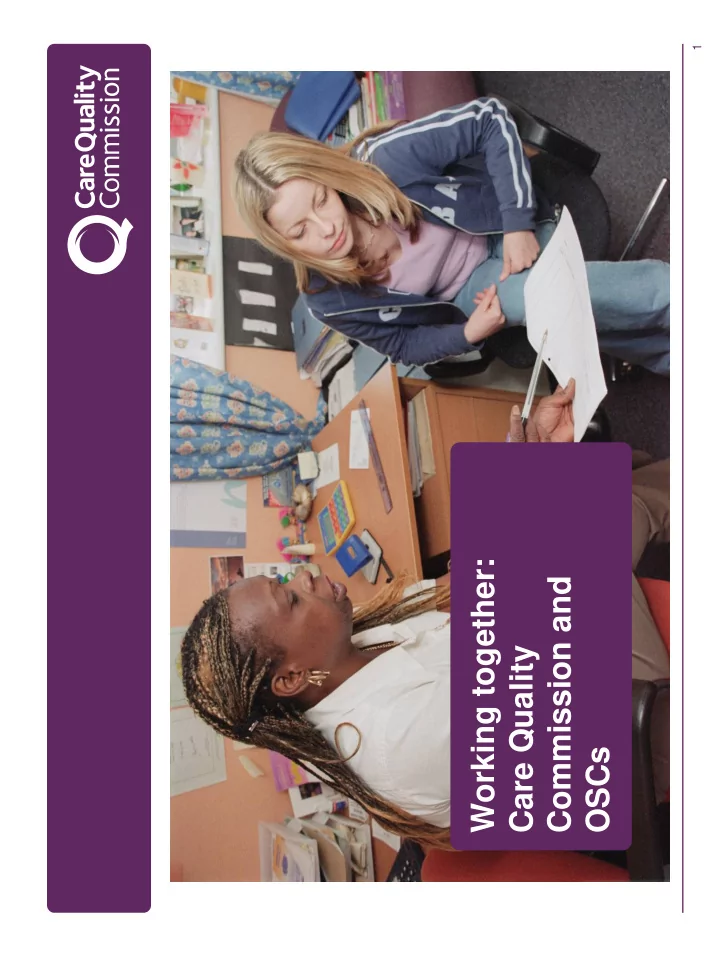

1 Working together: Commission and Care Quality OSCs
Today we will: • Share our ideas for working together • Learn about how CQC is assessing health and social care services • Discuss how you would like to give us your views and experiences of services 2
3 The Care Quality Commission
We have been given some new powers All providers of health and adult social care are required to register with us to show they meet essential standards of quality and safety: - NHS providers registered from April 2010 - Adult social care and independent healthcare from October 2010 - Dental services and independent ambulance providers from 2011 - Primary medical services including GP practices from 2012 4
We will also drive improvements Quality assessments of the performance of organisations that commission and provide care, and making sure they work together better (this includes primary care trusts and councils) Special reviews of particular services or pathways of care or themes. For example, care for families with disabled children Comprehensive Area Assessment – contributing information about care services to overall assessments of the quality of all local services in an area 5
Voices into Action Voices into Action’ is our commitment to working with you. We will involve you in our work, and invite you to tell us your views and experiences about health and social care. 6
We will act on behalf of local people We are: Making better use of peoples views and experiences of care in our assessments Checking whether people are involved in decisions about their own care Finding new ways of involving people in our work, including governance and inspection 7
We are involving people…. In all our activities In lots of ways ● In our decision ● Directly as experts by making experience and as advisers ● In our assessments of ● services Through surveys and consultations ● In our reviews and ● studies Through voluntary bodies, including Overview and Scrutiny Committees and LINks 8
We want Overview and Scrutiny Committees to: • know who we are and what we do • help us develop how we regulate health and social care services • have contact with local Care Quality Commission staff to share information • tell us peoples’ views and experiences of health and care services at any time in the year • know what we have done with any information they give us • Work with us more closely as we monitor services.
Working Together We both want better care for local people Your information has already made a difference: - Some OSCs have joined our national advisory group - Many OSCs have now shared information about their work with us in local meetings with CQC - OSCs are sending information through our website, commenting on our consultations and contributing to other work in CQC 10
Using your knowledge The information you have is important to us. We need to know: • What local people tell you about particular services and their care • What you find out about joined up care • The recommendations from your reports and ‘enter and view’ visits • The common issues and concerns you hear from different groups, especially people in vulnerable circumstances 11
Standards you can tell us about Essential standards for health and social care providers cover: • How people are involved in their care and the information they receive • How people get the individual care and welfare they need, including food and nutrition • How people are looked after safely (medicines, premises, equipment) • How people get the right care from the right staff • Whether services are well managed
Telling us what you know You can: • Share information with us at any time during the year • Meet with local CQC staff to discuss plans and tell them about issues • Send information to us through our website. Fill in a form and attach reports at www.cqc.org.uk/localvoices. 13
Telling us what you know You can now give us information about dental services in your community and independent ambulance services . It will be helpful to have this by the end of December 2010 to help us judge if they meet essential standards of quality and safety to register with us. We also hope you will raise any urgent concerns with us straight away if local solutions are not being found. 14
Using your information If you send us information through our website at www.cqc.org.uk/localvoices you will receive an email confirming we have received your information. It will be analysed and passed to our local staff who monitor the performance of the services. They will take it into account when they make decisions. If you pass the information directly to a local team they will record it and use it in the same way. The local team may follow up to find out more about the issues you have raised. Your local CQC contact can let you know how your information has been used in the meetings you have with them. 15
OVER TO YOU! What else would you like to know? How do you want to work with the Care Quality Commission? How would you like to share your information with us? 16
More information Go to our website: www.cqc.org.uk Send information to us about what local people think: www.cqc.org.uk/localvoices Sign up for our newsletter: www.cqc.org.uk/newsandevents Talk to your local CQC contact: 03000 616161 or enquiries@cqc.org.uk Get involved in our work nationally: Lucy.Hamer@cqc.org.uk or Clare.Delap@cqc.org.uk
Recommend
More recommend